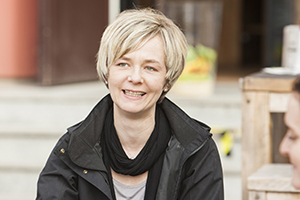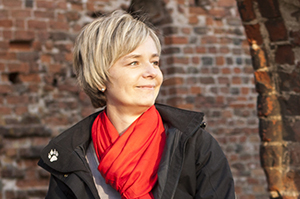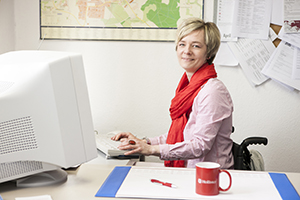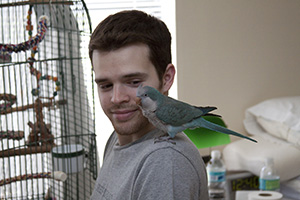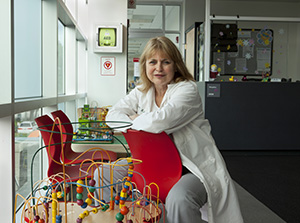Stories of Triumph and Inspiration
Jana Schulz, Germany
When Jana Schulz tells a story, she doesn’t mince her words or digress unnecessarily. She reminds us then of the Baltic Sea, on the shores of which her home town of Greifswald is located: honest, straightforward and sometimes a bit stormy too. The phrase “bundle of energy” must have been coined for Jana. The 39-year-old positively sparkles with joy of life and happiness – properties that are perfect for her work, for she is the director of Greifswald Meeting House, an institution, which gathers 30 self-help groups, organisations and associations for people with physical disabilities under one roof. An extraordinary place for encounters, which is unique in Germany – at least as one-of-a-kind as the director of the house.
“Honestly, I really thought I was going nuts!”
Without a trace of sorrow or despair, Jana tells about the first symptoms of her multiple sclerosis (MS) – the numbness in her legs and the initial signs of fatigue, which the skilled florist attributed to the many hours she spent on her feet while at work. And while many others with the same affliction puzzle over the cause of the insidious disease, it’s obvious to Jana: the death of her father, which she, as a “daddy’s girl”, could not accept. Today, Jana’s physicians also agree that this loss and the mental stress associated with it may have triggered the onset of the disease.
Thus began what Jana calls her “second life”, a phrase that recurs often in her conversation. This second life had its beginning 12 years ago with the diagnosis of MS. A disease to which the young woman had given no thought at all until it changed her entire life in the blink of an eye: catheterisation, learning to give herself injections, rehabilitation, life in a wheelchair – for Jana’s mental state, the period immediately after the diagnosis was extremely difficult. Until she told herself, “You’ve got to fight!”
That her life had to begin over again at the age of 27 was a source of some consternation at first. Especially that Jana could no longer pursue her career – and suddenly found herself in the situation of having to start drawing on her pension. “That was really a blow. You ask yourself, ‘What am I supposed to do now?’” It was a long time before Jana was able to deal with this new reality, since, of course, the young woman was confronted with many other demanding questions: “What do I do all day long?” “How do I handle the fact that I’m going to be dependent on outside help?” “And how do I keep my independence in spite of all this?”
Jana found the answers precisely in what she calls her second life. “I was totally aware that my old life was gone – and that something completely new was now beginning. I wanted to accept that and make it work for me as best I could.” She came to terms with her disease, at some point no longer thinking of it as a burden but rather as a chance for change. Jana seized the opportunity. MS even had a certain liberating effect – today Jana acts in ways and dares to do things that were unthinkable for her before.
From the dragon tattoo on her back to her commitment to volunteer work. “You should simply indulge yourself now and then – and do things you would otherwise never think of doing! It’s funny that I had to become so ill to reach this point. Sometimes I just shake my head over it all.” Jana’s credo is “keep on living” and don’t let your illness get you down. Don’t just pine away at home but enjoy the little pleasures of everyday life – from a visit to the hair salon to shopping. She definitely does not want to suffer from what she calls the “attention-getting syndrome” of a patient: “I am sick. Feel sorry for me.”
Jana’s second life has also brought her to meet people whom she perhaps would never have met in her first life. “I am really grateful for the many wonderful people I see every day at my job.” She found her way to the Meeting House in 2003 through an MS self-help group for young, recently diagnosed patients. Three years later, she was offered the directorship, which she accepted without having to think about it for very long. What was originally planned to be simply a meet-and-greet type of role turned into a job “which today is part of my life.” At the Meeting House, Jana deals with many matters: the integration of disabled people into society, the exchanges among patients about concerns above and beyond their various disabilities, and naturally, counselling in all its shapes and forms. This lively togetherness of widely different people and personalities is one of the purposes Jana has found for her second life – a purpose to which this bundle of energy will continue to dedicate all of herself.
